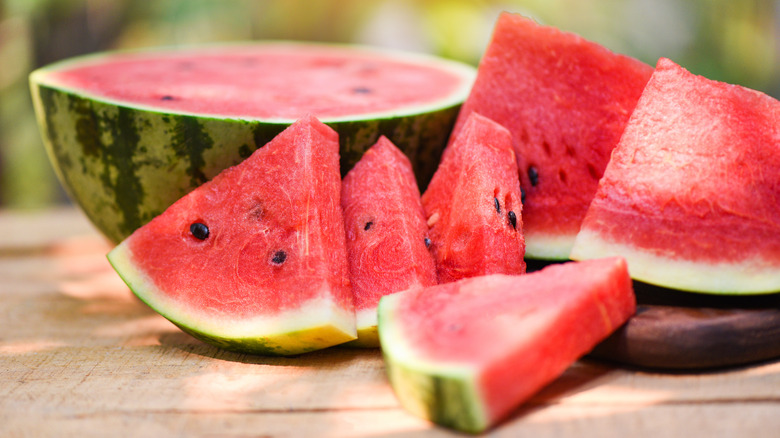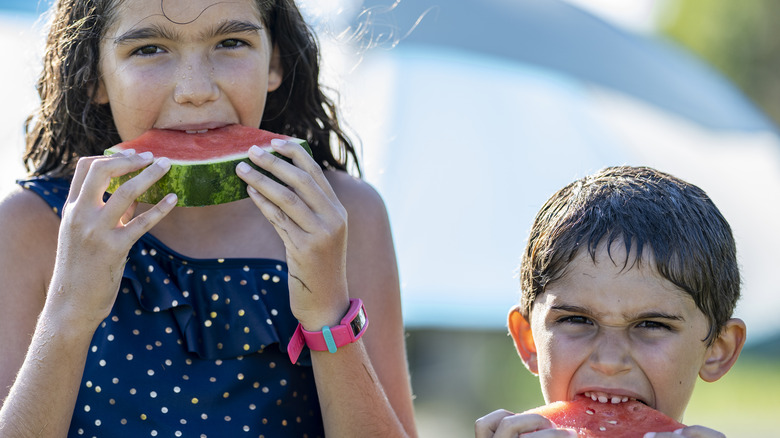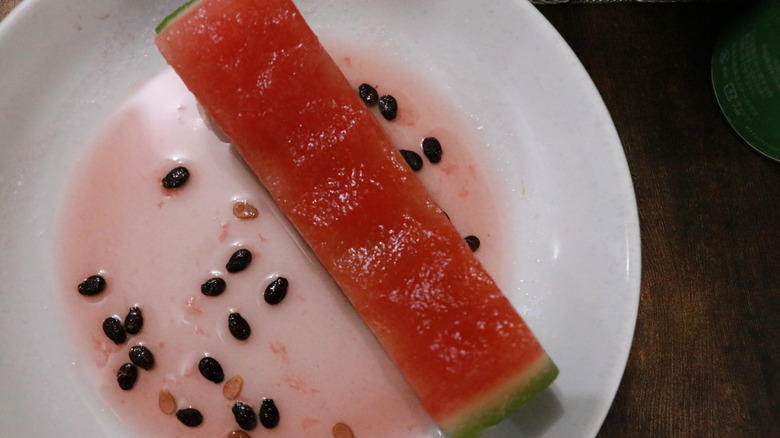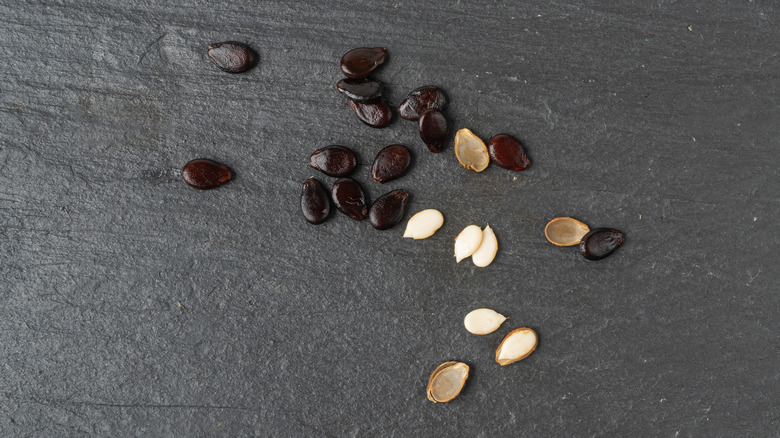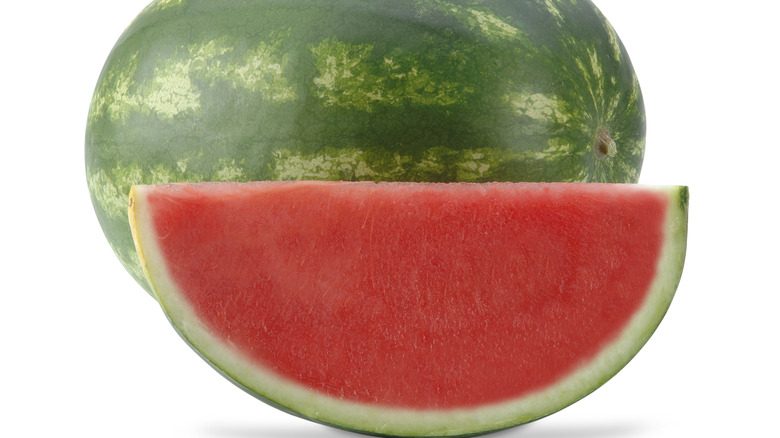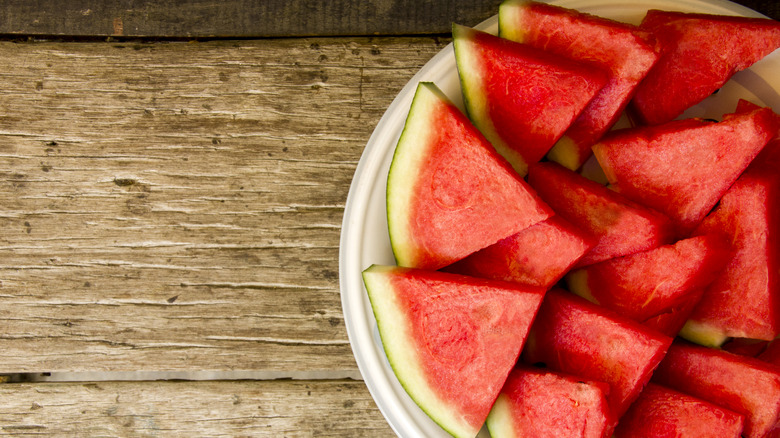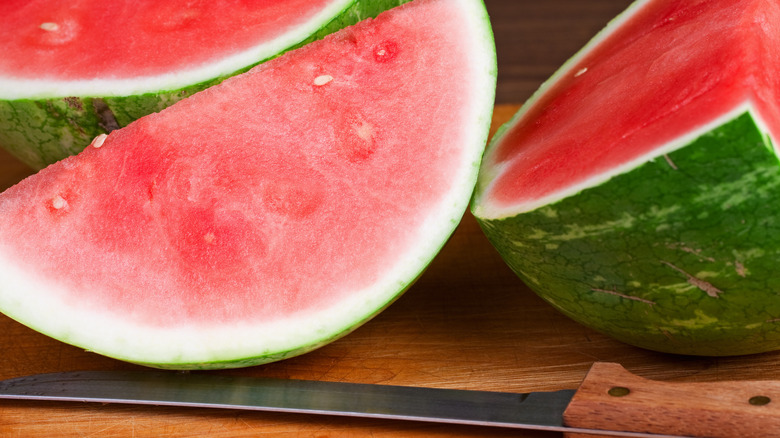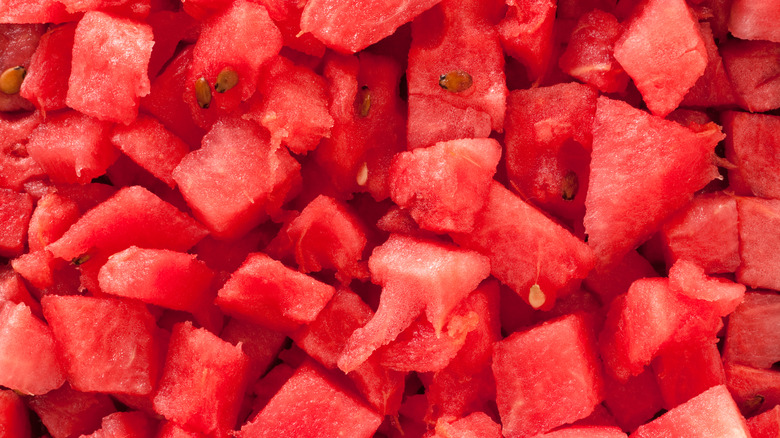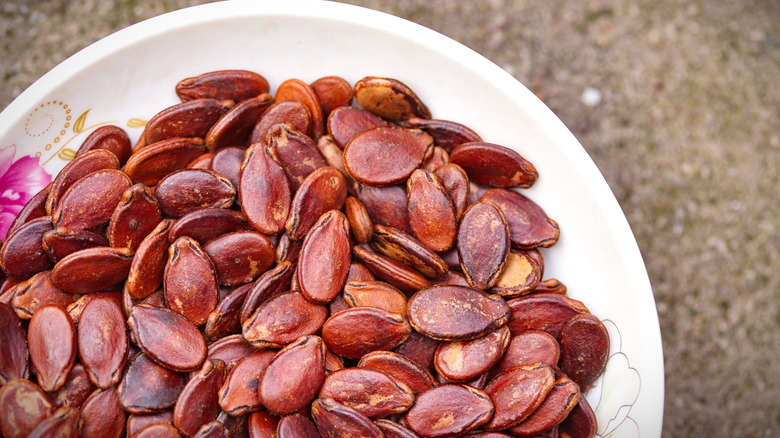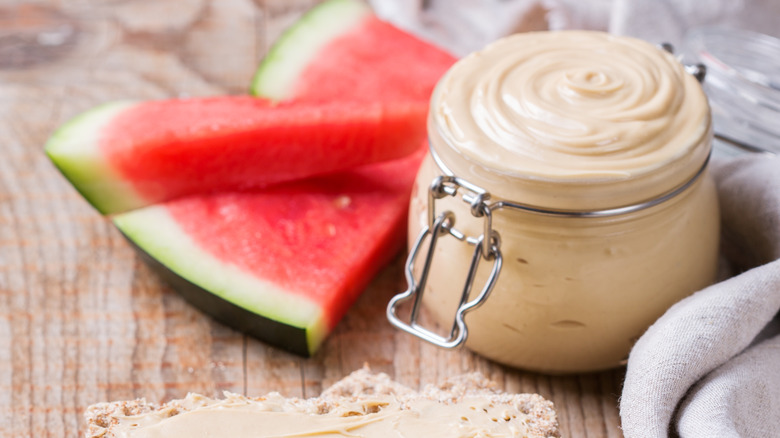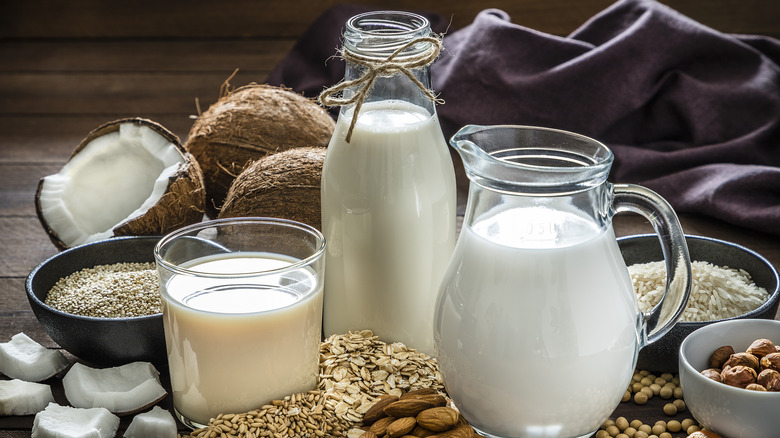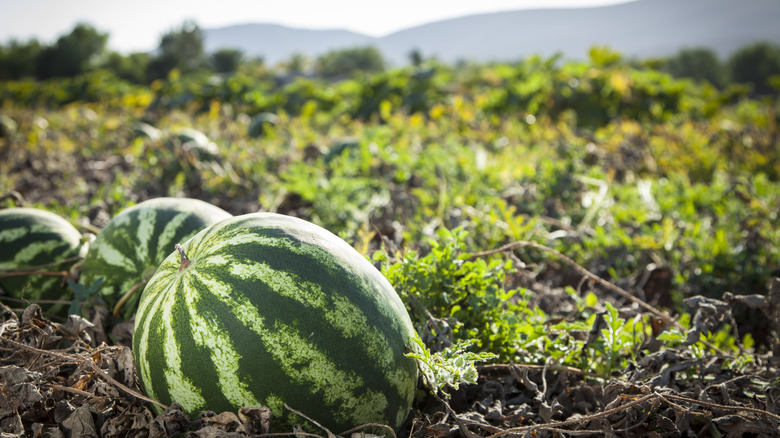Your Pressing Questions About Watermelon Seeds, Answered
Nothing says summer more than big juicy slices of watermelon. For many, eating watermelon is a nostalgic pleasure we enjoyed from childhood. The fruit invokes images of juice dripping down to your chin and maybe even some seed-spitting competitions.
That said, watermelon seeds can be an annoyance when you're trying to indulge in the bright fruity goodness. There's always a debate between those who meticulously remove them and others who simply don't bother, either spitting them out or swelling them with the rest of the fruit. Then there's the abundance of seedless watermelons on the market that remove the whole seed equation altogether. But seeds are good for you, right? Or are these seeds different, and is swallowing them maybe not such a good idea? Whichever way you enjoy your watermelon or deal with the issue of its seeds, there's some misunderstanding, folk tales, and science when it comes to watermelon seeds, and we're here to answer all the questions you may have about them.
Are watermelon seeds safe to eat?
Anyone who enjoys eating watermelon has pondered if it's safe to eat the seeds or if they might make you sick. It can be a bit of a hassle having to pick out the seeds or spit them out one by one while you're trying to enjoy the juicy watermelon flesh. As a child, you may have heard that eating the seeds will make a watermelon grow in your stomach, and even though you know you're now old enough to know better, that hesitation might have stayed with you!
Well, the truth is, eating watermelon seeds won't make you sick — in fact, they're perfectly safe to eat. While this isn't a blanket rule for all fruit seeds (some can make you sick if eaten in large quantities), when it comes to watermelon, the seeds are completely edible. You can put the watermelon growing in your belly story to bed once and for all. According to Very Well Health, they're insoluble fiber and will pass through your digestive system with no problems. There's no suggested limit to how much you can eat, but if you're not used to eating high-fiber foods, then you may experience some constipation or other discomforts if you eat too many at once. If fiber is a normal part of your diet, you likely won't experience anything out of the ordinary.
What is their nutritional content?
Not only is it safe to eat watermelon seeds, but they're actually good for you. While we already know they are a good source of fiber, the black seeds you find in watermelon have a number of nutritional benefits. They're high in magnesium, iron, and zinc, while being a low-calorie food. They also contain both monounsaturated and polyunsaturated fatty acids, meaning "good fats" which help to lower cholesterol and contribute to heart health. Watermelon seeds are also packed with a number of other vitamins and minerals, such as potassium, niacin, folate, and manganese. These vitamins and minerals promote bone, hair, and skin health, as well as better metabolic function, and support in regulating blood sugar levels, per NDTV.
Among the many nutritional benefits of eating watermelon seeds, they're also a source of protein, meaning that snacking on them adds more protein to your diet. While eating watermelon seeds is not as common as eating sunflower seeds, or other popular seeds like sesame, poppy, or pumpkin seeds, watermelon seeds are so good for you nutritionally, that they deserve to be eaten in their own right, and not just as a byproduct of eating watermelon.
Is there a difference between white and black watermelon seeds?
Most watermelons that aren't seedless have a mix of both white and black seeds speckled across the pink (or yellow or orange, depending on the variety) flesh, while some seedless watermelons still have white seeds. We've already ruled that watermelon seeds are safe to eat and that the black seeds have been singled out for their nutritional benefits, but what about the white seeds? What's the difference between white and black watermelon seeds, and why are there two kinds of seeds in a watermelon?
To understand this difference, we need to clarify that white "seeds" aren't seeds at all. In fact, these are empty coats of seeds that haven't matured yet. So, basically, white seeds are just black seeds that haven't ripened. If you look at them another way, these soft white specks are baby seeds, still finding their form — that's why they're much softer than black seeds, and sometimes almost translucent looking. They're also perfectly safe to eat but don't contain the nutrients that fully mature black seeds do.
Why are people growing seedless watermelons?
As any watermelon lover can attest, it's a dream to eat watermelon without having to work our way through a bunch of tiny seeds with each bite. Seedless watermelons are one of those food science wonders — all the delicious, crisp flesh without having to take out seeds as you munch. Naturally, watermelon growers want to meet our desires for hassle-free watermelon enjoyment, and it's incredibly achievable for them to do so. The science behind seedless watermelons isn't very complicated, and it all has to do with how you pollinate your watermelon plants, and a chemical called colchicine. Colchicine is added to watermelon cells as they're splitting to create a tetraploid which has 44 chromosomes (female) — double the amount of a diploid, the normal watermelon plant, which has 22 (male).
The National Watermelon Promotion Board explains that all it takes is cross-breeding pollen from a male watermelon flower with a female watermelon flower. This creates something called a triploid seed, which grows sterile hybrid watermelons that are unable to grow mature seeds. Apparently, people love seedless watermelons so much that they make up about 92% of all watermelon sales. There's way more profit involved in selling seedless watermelons than selling the seeded variety, which only account for 8% of sales.
Do seedless watermelons taste the same?
You might be wondering if the science that goes into creating seedless watermelons affects their taste. Although we may love the convenience of seedless watermelons, some people complain that they're bland or less flavorful and sweet compared with seeded watermelons. While taste is completely subjective, and many people might differ on whether seedless watermelons taste different from seeded ones, it's important to note that there's no scientific reason to support this.
In fact, if you think seedless watermelons taste different, you might just be imagining things. Taste has everything to do with other environmental factors like climate, location, and the quality of the soil — things that affect all watermelons regardless of whether they're seedless or not. In fact, it would make more sense for seedless watermelons to taste better given that triploids have three sets of genes (instead of two), which would result in the genes that affect taste being more pronounced.
Why do some seedless watermelons still have seeds?
So you've decided you don't want to bother with seeds in your watermelon and decide to buy a seedless one, only to find that it still has some white seeds. While you might think the growers have messed up somehow, that's actually not the case.
Seedless watermelon may still contain white "seeds" because, as mentioned above, the white specks in your watermelon are actually casings of seeds that haven't matured yet. It actually makes sense to find them in your seedless watermelons because they have been cross-bred to produce fruit that can't grow mature (black) seeds. The white seed casings develop but then can't continue to grow because they're not genetically viable to develop and turn into black seeds. While you might get a seedless watermelon without any white seeds, it's more likely you'll come across a few. Not to worry, of course — they're completely safe to swallow, much smaller than black seeds, and really soft, so you'll barely notice them while you eat.
Is it better to eat seeded watermelon than seedless watermelon?
In terms of taste, we know that it's a myth that seedless watermelons are less tasty than seeded ones. Nothing about the process that creates seedless watermelons affects their taste. As for nutritional benefits, we know that watermelon seeds are high in certain minerals like magnesium, zinc, iron, and folate. Does this make it better to eat seeded watermelons than seedless ones that don't have the nutrients that black seeds provide?
In truth, both seeded and seedless watermelons have nutritional benefits. Watermelon flesh is a great source of potassium, fiber, and water, meaning it aids in hydrating you (which is great, especially in the summer when you need that most). Watermelons also contain vitamins C, B6, and A. Red watermelons are the fruit with the highest amount of an antioxidant called lycopene, which has several health benefits, including that it's cancer-fighting and can protect against sun damage (per Healthline). So regardless of which type of watermelon you're eating, you're still aiding your health with nutritional benefits.
In sum, it all comes down to your preference, but one isn't clearly superior to the other. What you enjoy more is most important, as well as whether or not you're bothered by the seeds.
Can you roast watermelon seeds?
Not only is it fine to swallow watermelon seeds, but they can be eaten as a snack in their own right, like pumpkin or sunflower seeds. When eaten raw their texture is not as pleasing (they somehow manage to be both chewy and hard), but you can also roast your watermelon seeds for an enviably crunchy snack. Not only does their texture transform, but they also develop a richer flavor. So next time you enjoy a seeded watermelon, rather than throwing away the black seeds, get them ready for roasting.
The first step to roasting them is to wash them of any fruit bits and then leave them to dry until completely dry. They won't get crunchy if they have any water on them. The next step is similar to roasting other seeds. Once they're dry, you can toss them in some olive oil and then roast them in the oven at 325 F for about 15 minutes. If you want to flavor them, you can add salt, pepper, and any spices you enjoy after they come out of the oven. Some options are cayenne pepper and lime juice, or even sweet with sugar and cinnamon. Roasted watermelon seeds are versatile and the flavor possibilities are as endless as your spice and condiment pantry.
What are the different ways that people use watermelon seeds in recipes?
Other than roasting watermelon seeds, you should save your watermelon seeds for a tahini-esque butter. Move over almond butter and sunflower seed butter! Watermelon seed butter makes for a great nut-free spread if you or your loved ones have nut allergies. It's a little tricky to make, but not impossible — you're either going to have to shell them first (once roasted) or sprout them, and their shells will naturally fall off. Once shelled, all you have to do is blend them up to your desired consistency and your watermelon seed butter is ready to eat. The result is creamy and delicious. If you're looking for a major shortcut, you can also buy watermelon seed butter ready-made.
There are other surprising and delightful ways to eat watermelon seeds. Starting with the seed butter as your base, you can make a tangy sauce, dressing, or vinaigrette, by whisking it with some olive oil, lemon juice, mustard, and some seasonings.You can also use watermelon seeds in a mixed-seed protein bar. Seed bars are a great snack to have on the go especially when you need something a bit more filling that's packed with nutrients. You can either use the seed butter as your base or add your roasted watermelon seeds into your seed mix — or both!
Can you make milk from watermelon seeds?
Dairy-free plant milks are on the rise and every few months it seems like there's a new one on the market. We may have started with soy and almond milk, but these days it's possible to find milk drinks made from oats, hemp seeds, hazelnuts, peas, peanuts, and more. Nuts and seeds are obvious choices for plant-based milks because they're rich in nutrients, fats, and protein, while also producing a milky-colored liquid that suits our sensibilities when looking for an alternative to cow's milk.
Well, add watermelon seeds to the list. The basic concept is the same as making seed and nut milk. Blend watermelon seeds with water and optional sweeteners like dates, sugar, or syrup. The result is a pale brown, milky color as well as a stronger and slightly nuttier taste than pumpkin seed milk to which you can add vanilla, cinnamon, or other flavors. Use in your lattes, cereal, or whatever else you like to use plant milk in.
Watermelon seed milk is a novel idea, and because it's not as common as other seed milk, there are very few recipes available that show you how to make it. With the increase in the popularity of plant-based milk, we think watermelon seed milk will become more of a thing in the future. Some vegan cheese companies are even using it to make cheddar and mozzarella.
Can you use the seeds in your watermelon to grow watermelons yourself?
If you're interested in planting your own watermelons there are some things to keep in mind about the seeds. Technically, you can grow a watermelon from the seeds of the watermelon you bought at the store, but the result will be a small, rather tasteless watermelon that won't resemble the one you retrieved the seeds from. This is because watermelons you buy at the grocery store are usually hybrids and the seeds are not viable for replanting. Plus, if the watermelon has been chilled in a fridge at all, the seeds will be damaged from the cold and unable to grow.
The best way to grow watermelons is to buy seeds from a nursery or gardening store. There, you can ask for seeds that are grown to bear the best watermelons for eating (and replanting). Growing watermelons takes a lot of care, sunshine, and water, so make sure you've done the research and asked for advice where you can.
